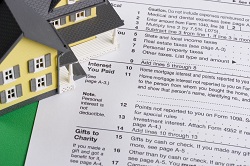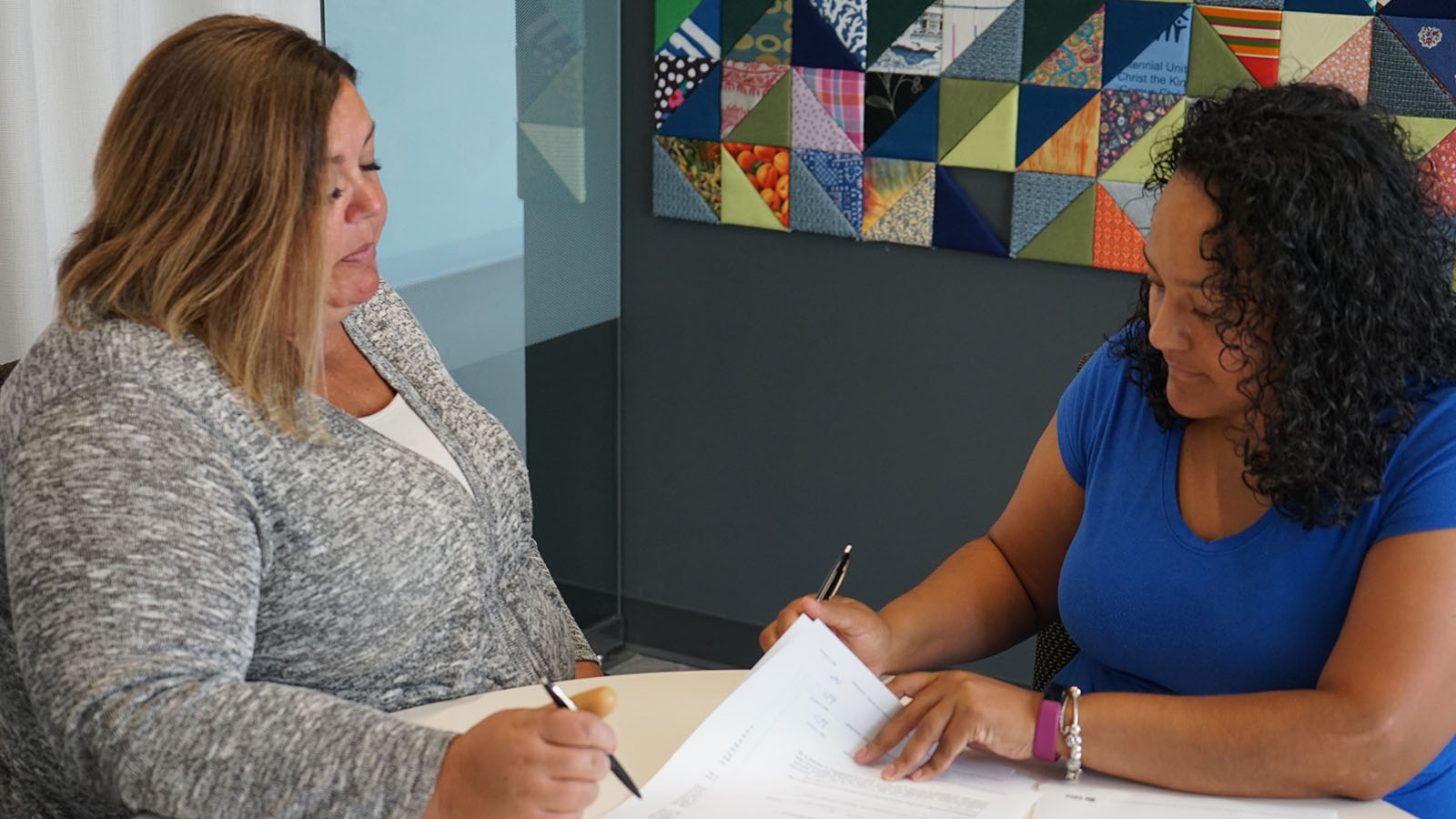What’s in a mortgage payment?
If you’re considering buying a home, it might be time to understand a mortgage. Taking on a mortgage can be intimidating, but you’ll be better...

 April 15 is behind us, but that doesn’t mean that we can stop thinking about taxes altogether. Although much of the interest this time of year is on income taxes, there is another type of tax that, if not paid, can result in a people losing their homes: property taxes.
April 15 is behind us, but that doesn’t mean that we can stop thinking about taxes altogether. Although much of the interest this time of year is on income taxes, there is another type of tax that, if not paid, can result in a people losing their homes: property taxes.
What Are Property Taxes?
To understand what property taxes are, it is first important to understand what taxes are. Taxes are the primary source of funding for government organizations and are essentially each person’s share of the services provided by the government. When collecting money from private individuals, governments typically use at least one of three types of taxes: income taxes, sales taxes, and property taxes. Most taxes can be described as progressive or regressive. Progressive taxes charge people who have more assets a higher percentage of those assets. Regressive taxes charge people who have less assets a greater percentage of those assets than people who have more assets.
Income Taxes
Income taxes are levied based on a person’s income and the percentage of a person’s income that the government collects typically increases along with the income (this percentage of income is what we call a “tax rate” and taxes that increase along with income, making it a progressive tax. What this means in practice is that a millionaire would be required to pay a higher percentage of his or her income in taxes than a minimum wage worker would. In Minnesota, the state and federal government are the only organizations that can collect income taxes. Some states, Florida for example, do not require people to pay income taxes. However, the revenue that is lost by not collecting income taxes is typically made up for by requiring people to pay increased property or sales taxes.
Sales Taxes
Sales taxes are taxes that are paid by people who purchase or use a particular product or service. They are seen as a “voluntary” tax because people don’t have to pay them if they don't buy the affected product or use the affected service. The price of the tax is typically added to the price of the affected outcome, collected by the retailer or service provider, and paid by them to the state every six months. In Minnesota, city, county, and intergovernmental organizations have the ability to charge sales taxes but most of them are levied at the county level. In practice, sales taxes can be regressive if they are applied to something that everyone needs (for example, food and clothing). A millionaire living alone and a minimum wage worker living alone are likely to need a similar amount of food and clothing. If that food costs $200 a month, the minimum wage earner will pay a much greater percentage of his/her income than the millionaire. However, on purchases that are not basic needs, the voluntary aspect of sales taxes comes into play. Both parties would pay the same sales tax if they bought a Rolex but it’s highly unlikely that the minimum wage earner would buy a Rolex, thus avoiding having to pay the tax.
Property Taxes
Property taxes are the primary source of income for governments that cannot charge income or sales taxes (like counties and cities). They are used to fund schools, police departments, roads, and parks. They are criticized as being the most regressive tax because they are assessed based on the value of the land and what is built on it with no relation to the homeowner’s income or other assets. A millionaire living in a $50,000 house would be asked to pay the same amount of property taxes as a minimum wage earner living in the same $50,000 house. Even though they pay the same dollar amount of taxes, the minimum wage earner obviously pays a much higher percentage of their income in taxes than the millionaire.
In Minnesota, property taxes are calculated and collected by the county. They are calculated on a yearly basis but collected every six months (on May 15 and October 15). When a person misses a property tax payment, that missed payment is added to the next payment along with a late penalty calculated based on a percentage of the tax that is late.
What Happens if I Don’t Pay Property Taxes?
In addition to being regressive, property taxes also have some of the most severe consequences for not paying them. Sales taxes and income taxes are both levied against the person so the person faces the consequences if they are not paid (usually in the form of the fines or jail time). Property taxes, on the other hand, are levied against the property so the property faces the consequences.
In Minnesota, the consequences are very simple: The organization levying the taxes takes the property through a process called Tax Forfeiture. The process starts the January 1 after the first year that a person misses a payment. Therefore, if you missed the payments due on May 15 and October 15 of 2013, the Tax Forfeiture process would start on January 1, 2014. After January 1, 2014, the process starts what is known as the “Redemption Period.” During the Redemption Period, the homeowner must pay all of their delinquent taxes plus the current year’s taxes to retain title to the property. Depending on the area that a person lives in, the Redemption Period can last three to five years.
After the third to fifth year (depending on where the house is) of unpaid property taxes, the Redemption Period ends and the County sends the homeowner a Notice of Expiration of Redemption. This is a final warning to the homeowner that if the homeowner does not pay the current year's taxes plus the taxes that are overdue plus late fees or fines, the County will seize the property. The County sends the homeowner the first copy of the notice the March after the end of the Redemption Period. Four to six weeks later, the County sends the homeowner a second notice. These Notices are also published in the local paper. If the homeowner has not paid the property taxes by the end of May, the county takes the property and evicts the homeowner.
How Do I Keep This From Happening?
As with any other debt, the only way to keep a property subject to Tax Forfeiture proceedings is to pay the debt. Because the amount owed in property taxes is cumulative and also includes an interest penalty, homeowners who are behind in property taxes can end up owing much more than the actual value of their taxes. In extreme cases, this can add up to $30,000 or more.
Obviously, a lot of people are going to have difficulty paying that amount of money out of pocket. Fortunately, the state of Minnesota recognizes this fact and allows people to pay their back property taxes to the state in an installment plan. This installment plan is called a Confession of Judgment. It allows the homeowner to pay the delinquent taxes and fees back over a period of ten years (10% a year) until it’s due. This is typically combined with the amount of property taxes that are due for the years that Confession of Judgment payments are made. Because the interest rate used to calculate the penalty is so high, entering into a Confession of Judgment is far from a good deal monetarily. However, it provides a way for a person who is behind in property taxes to keep his or her home without having to pay thousands of dollars up front.
For homeowners who are over the age of 65, the State of Minnesota has the Senior Citizens Property Tax Deferral Program. What this does is cap the amount of property taxes owed by seniors at 3% of their income. The rest of the property taxes get attached as a lien on the home. As long as the senior owns the home and is in the program, they don’t have to pay the lien. However, when ownership of the property changes, whether by death or a sale, the remaining value of the taxes and fees has to be paid before the buyer or heir can take possession of the property.
How Can Twin Cities Habitat for Humanity Help?
The Mortgage Foreclosure Prevention Program at Twin Cities Habitat for Humanity can help homeowners communicate with the county to determine the amount of property taxes owed and negotiate a Confession of Judgment. If the homeowner also has a mortgage, the MFPP can also help the homeowner work with their mortgage company to find a way to make the mortgage and property taxes more affordable. If the property goes through tax forfeiture, the mortgage and home equity loan companies can try to collect the amount of their loans from the homeowner him or herself. Often people who are behind on their property taxes are having issues with their mortgage as well so working on one may not actually solve the problem.
Carly Schaps
Your gift unlocks bright futures! Donate now to create, preserve, and promote affordable homeownership in the Twin Cities.

If you’re considering buying a home, it might be time to understand a mortgage. Taking on a mortgage can be intimidating, but you’ll be better...

To understand property taxes, it may help to start with something more familiar: Sales taxes. Imagine you're at a restaurant and you order $23 worth...

Owning a home is a significant goal for many people. It’s a big step–the biggest single investment most people will ever make. Understanding how to...